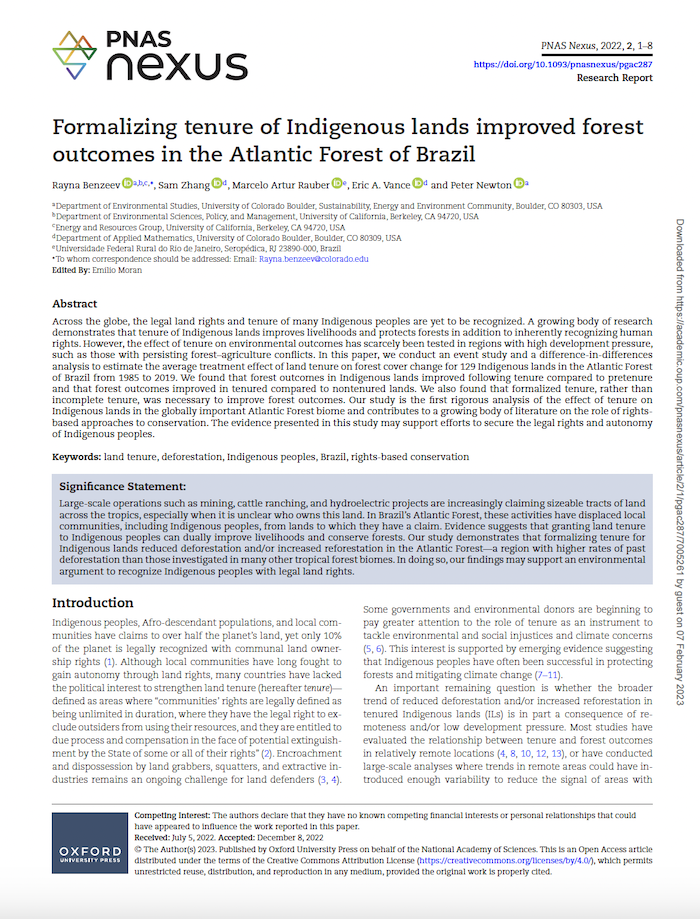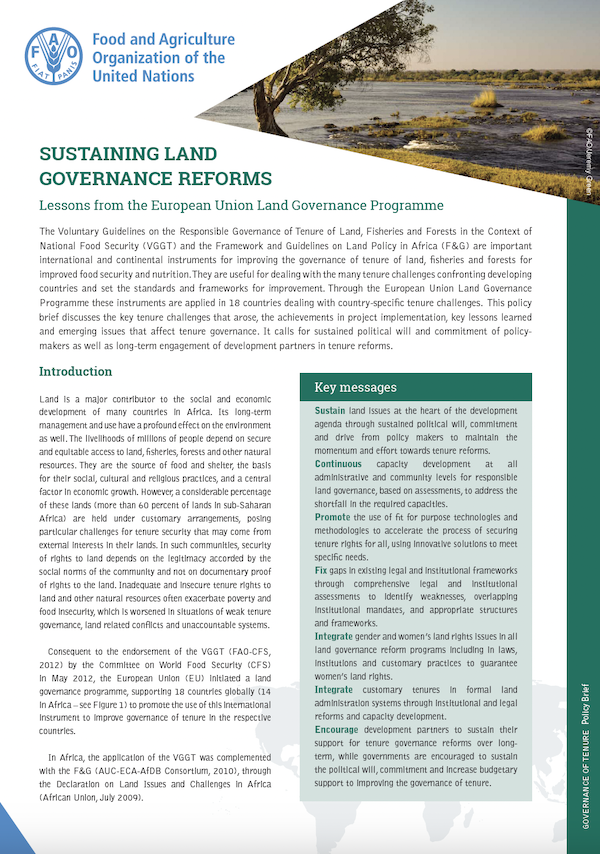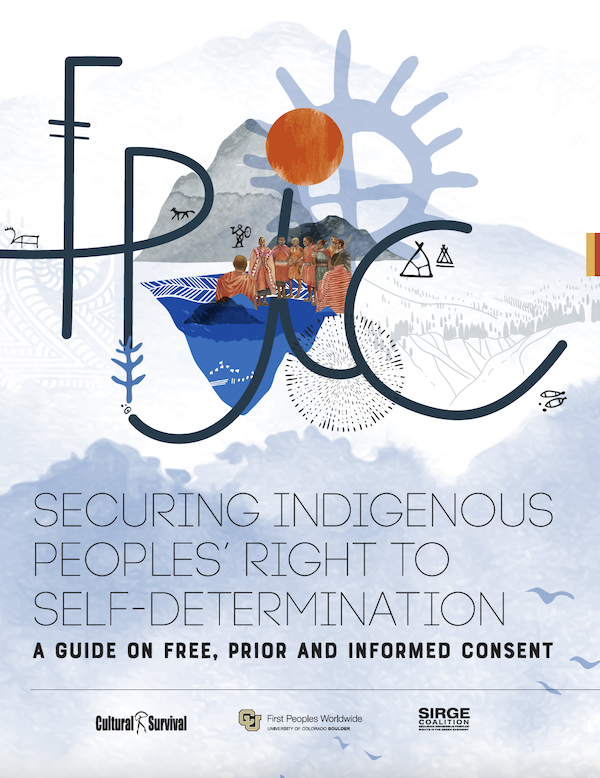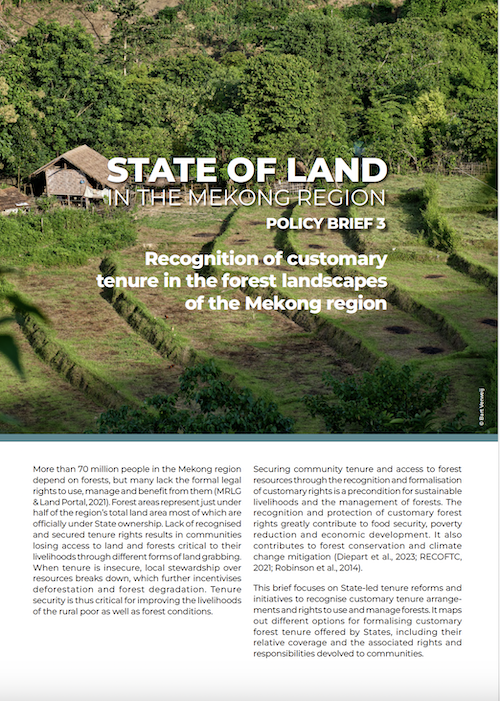Autonomía indígena en Panamá: las comarcas indígenas
La Constitución Política de la República de Panamá de 1972 (CPR), “reconoce y respeta la identidad étnica de las comunidades indígenas nacionales”, y dispone que el Estado debe establecer programas tendientes al desarrollo de dichas culturas y su protección. Este texto revisar la normativa legal que reconoce las comarcas indígenas como territorios indígenas autogobernados.
Formalizing tenure of Indigenous lands improved forest outcomes in the Atlantic Forest of Brazil
Across the globe, the legal land rights and tenure of many Indigenous peoples are yet to be recognized. A growing body of research demonstrates that tenure of Indigenous lands improves livelihoods and protects forests in addition to inherently recognizing human rights. However, the effect of tenure on environmental outcomes has scarcely been tested in regions with high development pressure, such as those with persisting forest–agriculture conflicts.
Autonomía territorial indígena en Panamá: las comarcas indígenas
El derecho internacional ha avanzado en las últimas décadas hacia el reconocimiento del derecho de los pueblos indígenas a la libre determinación, expresada en regímenes de autonomía o auto-gobierno en sus territorios. En este sentido, la autonomía territorial indígena es un régimen acordado, que permite a los pueblos concernidos el control de sus propias instituciones sociales, políticas y culturales y de sus territorios, en el marco del Estado en que habitan. En el caso panameño, la figura donde se concreta la autonomía indígena es la Comarca.
Autonomía indígena en Panamá: las comarcas indígenas
Este documento analiza la creación de las comarcas indígenas en Panamá desde una perspectiva legal.
Sustaining Land Governance Reforms
The Voluntary Guidelines on the Responsible Governance of Tenure of Land, Fisheries and Forests in the Context of National Food Security (VGGT) and the Framework and Guidelines on Land Policy in Africa (F&G) are important international and continental instruments for improving the governance of tenure of land, fisheries and forests for improved food security and nutrition. They are useful for dealing with the many tenure challenges confronting developing countries and set the standards and frameworks for improvement.
Indigenous Peoples and Local Communities Forest Tenure Pledge Annual Report 2022-2023
This second Forest Tenure Funders Group (FTFG) annual report analyzes progress against the five-year, $1.7 billion commitment to the tenure rights and forest guardianship of Indigenous Peoples and local communities (IPs and LCs) in tropical forest countries announced at COP26.
Securing Indigenous Peoples’ Right to Self-determination:
“Free, Prior and Informed Consent (FPIC) is the first line of defense when investors and government officials seek to develop projects that may affect Indigenous communities, lands, territories, and resources. For this reason, Indigenous Peoples must be prepared to engage with FPIC from a fully informed, proactive stance. Indigenous Peoples must have their FPIC protocols ready, and be ready to lead engagement around FPIC on their terms.” –Securing Indigenous Peoples' Right to Self-Determination: A Guide on Free, Prior and Informed Consent
Recognition of customary tenure in the forest landscapes of the Mekong region
The policy brief, one of four briefs on the agrarian transition in the Mekong region, explores initiatives and pathways forward to recognise customary tenure arrangements and rights over forest areas in the region. More than 70 million people in the region depend on forest areas but lack formal legal rights to use, manage, and benefit from them. Forest landscapes represent just under half of the region’s total land. Yet, over the past two decades, the region has lost a significant amount of forest due to the expansion of commercial agriculture.
Potential Risks to Women’s Land Rights From Climate Actions: Exploring Matrilineal Communities in Colombia, Costa Rica, and Panama
This paper explores ways in which global actions to tackle climate change can potentially undermine women’s land tenure security. While there is greater cognizance of the role of secure land tenure as a critical enabler of global climate goals, climate actions that fail to account for differential tenure systems and gender dynamics risk eroding women’s customary land rights and associated social support systems. The paper recommends ways to balance climate goals with land rights protection.










